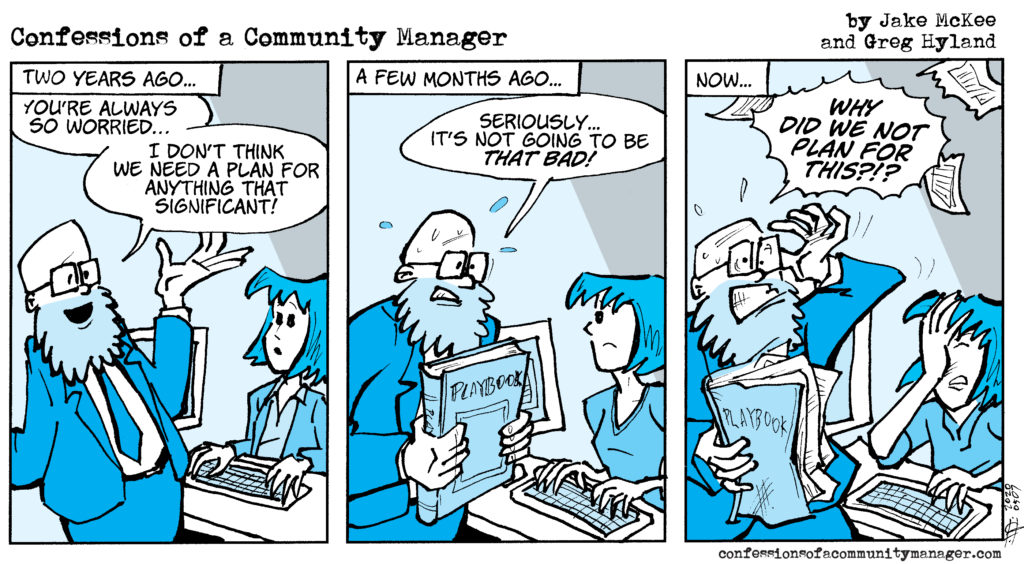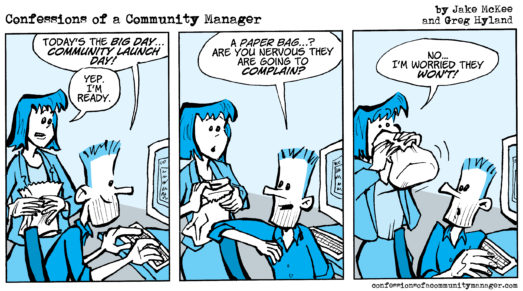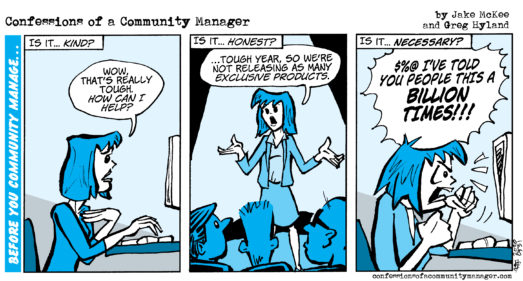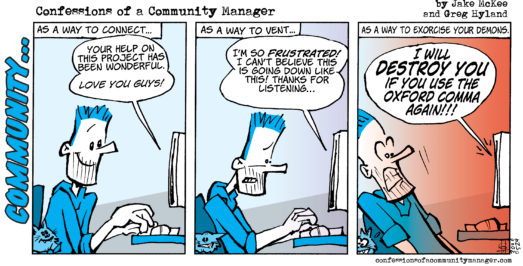Conflict Expectant
Note: I wrote this post two weeks ago before George Floyd’s murder and before protestors took to the streets. Rather than update the post to be more inline with the current events, I wanted to leave it as-is as generally relevant content.
If you live in Florida, you know that there’s a very, very good chance that you are going to live through a hurricane at some point. It’s just part of the Full Florida Experience.
Residents are “hurricane expectant”. They just expect that a hurricane is going to roll through. Doesn’t mean they’re not scared for their security or their house or their family. But they also aren’t surprised that a hurricane might hit the coast.
Communities are the same way. We are “conflict expectant”. It’s not a matter of if, but when… and to how much. My old boss, Brad used to joke when things were quiet “should we break something so the community remembers how much we care?” (No Brad, no we shouldn’t…. something always goes wrong soon enough, stop tempting fate)
Community Professionals are constantly working to convince their organizations NOT to make tragic mistakes when things are going well. Moderation teams aren’t being over burdened by the trolls? Lay off half the staff, we clearly don’t need them. The community is generating their own content at a steady clip? Don’t hire another content writer as originally planned. Super Fans are responding and leading the community? Who needs these extra Community Managers?
These are remarkably bad thoughts for an organization to have. Just like it’s a remarkably bad idea for me to say to myself “I haven’t had an accident in 3 years, I probably don’t need car insurance after all!”
There’s a strange phenomenon when a hurricane rolls into town: People turn on the news, watch the forecast, see the weatherperson giving the update, then debate whether it’s time to board up the windows or whether they should leave town. There’s a point at which you have to see the meteorologist (or their unlucky lackey) clinging for dear life to a stop sign, feet off the ground, rain coming in sideways before you think “it’s time for me to pack it up and get out of town”. We need that visual notification to tell that part of our brain that explains away crisis as “no big deal” that this is, in fact, a big damn deal.
Sometimes it takes putting things into perspective before others can grasp the reality of them. So when your colleagues start talking about shutting things down, dial down your emotions and embrace a “conflict expectant” approach:
- Prepare in advance for this meeting. Come ready with a written, printed plan (more on a second)
- Calmly state that you understand their desire for change and how they are looking out for the organization
- Tell them that you (and therefore the organization) is “conflict expectant”, meaning that their decisions will lead to community conflict flair ups. Explain this at a VERY quick and VERY high level
- Share your printed details of the three (not two, not four, but three) scenarios of how this may go within the community. These details should be one pagers. (Bonus: get a designer to help you lay these out as brilliantly designed documents)
- Don’t push them to change their minds, simply share that you are helping them prepare for the inevitable and ask them for their support getting ready for the fallout
- Prepare to turn and exit the room and find your meditation spot… you may have to prepare the community, directly or indirectly, for the pending shitstorm
Sometimes the audience has to watch the meteorologist clinging to the stop sign with one hand yelling into the microphone with the other hand before they listen. There’s not much you can do until that happens. But you can certainly be prepared to act, and you can certainly have prepared yourself to look like a damn fortune teller when it does happens so they’re more inclined to listen next time.
NOTE: If you want to check out some great links on getting ready for crisis communication, check out readyrating.org from the Red Cross, or read a great story about how Texas grocery store chain H-E-B got ready for the COVID-19 pandemic and weathered a massive storm in a great way.
I had the great pleasure of developing this concept of Conflict Expectant with my friend and Dinner5 Alumni, Juan Garza over lunch a few months back. Juan is the Manager for the Community Management team at Stack Overflow where he helps to oversee the 170+ communities of the Stack Exchange Network.
I asked Juan a few questions he was kind enough to answer below:
Crisis management is something you know a little something about. How do you handle this concept of “Conflict expectant” in your day job? What does that even mean?
You’re right, crisis management is as normal to a Community Manager as replacing the brakes on a delivery truck. As long as people continue to be the main participants of a community, conflicts will always be hiding somewhere in the queue. It’s really not a matter of “how” but rather of “when.” This concept of conflict expectancy comes from the awareness of the repetitive (and somewhat cyclical) nature of conflicts found in communities everywhere. You may have heard of the recent issues that Wikipedia is facing right now which goes to show that any community, be it auto enthusiasts or academics, will have to face conflict during their lifecycle.I believe that understanding what the conflict cycle for your specific community is can become essential to its long-term success. Let me give you a fairly simple example. Say you run a community of tech enthusiasts, like cell phone users. You’ll undoubtedly be aware that many manufacturers follow a predetermined date for new product launches. This means that your members will typically be very interested in conversations during these days and opinions and facts will meet head on. If you can anticipate these dates and prepare beforehand, you’ll be in a better position to actually help your members exchange information in a helpful way. Understanding a cycle like this can actually help you, that’s what makes it so important.For me, being conflict expectant means that I’m not surprised when things escalate throughout our communities. I want to try to get ahead of large changes that could cause divisions or strong emotions from community members. This also helps me not to lose my cool when things do get weird or tense. Conflict is a part of life and we can either grow or wither because of it.
Community Managers seem to spend a fair amount of time trying to convince the world in advance of a problem that problems are just part of the community experience. Any tips on how to get colleagues to help support your community management journey without saying “if this is so problematic, why are we doing it?”
Internal communication across different teams is key in getting buy-in and understanding from all parties involved. People need to see conflicts like puberty. It’s really embarrassing when it happens but the end result is always (well, mostly) better. Community Managers should try to be selective about the things they escalate. Remember that others in the org may not understand the differences between a situation that becomes a war and one that ends fine. It’s up to us to define and predict where the conflicts will go and this comes from experience and forethought. If you can, try to lean into acting like a weather reporter who simply forecasts what a storm is doing instead of being the tornado siren that freaks everyone out everytime, all the time. A good way to encourage others to support your position is to help them see where their wins could be. How can the marketing teams benefit from a coming conflict? Is there opportunity to share content, write articles, lead up a podcast, or recruit volunteers for a meetup? How can the sales teams benefit from these conflicts? Can they promote a certain product or scrub certain campaigns until the conflict passes? Find ways to help them gain from these situations.
What’s the best way to avoid/reduce conflicts in a community?
This is a hard one to answer because you actually want conflict in your community – that’s what keeps a lot of discussions going. But, you don’t want user wars where people will leave or divide the community. Like any healthy relationship, having a set of rules that are agreed on before a conflict happens can be helpful when the conflict does happen. Be watchful for your own emotions and be ready to get a second or third perspective in cases where swift movement could cause things to explode. No one gets this right all the time, we’re all learning, but remember to use the lessons learned for the next time.
What’s the funniest/strangest/craziest story about community conflict/crisis you’ve had to go through?
I have plenty of stories and most of them have to do with the “community” of my immediate family. But, I won’t share those, they’re too embarrassing!
One that I can share comes from a parenting community I managed years ago that also had a marketplace. This community had volunteer members that would host co-ops and take people’s money to make a large order and then redistribute the goods to those in the group. Well, as you can imagine, the task was cyclical and usually involved decent amounts of money and trust being shared online. There was one member in particular who led these and she excelled at organizing the co-ops. As I got to know the community more, I realized that I really needed to find someone to help transfer the knowledge of those transactions instead of relying on one individual. But, that community member was well respected and there had never been any issues….until one day when there was. If I had been conflict expectant I would have prepared for that event before the conflict became a crisis. My failure to identify the specific cycles of conflicts in that community prevented me from successfully leading the community (and the company) out of that situation and into a better one.
Thanks, Juan!



